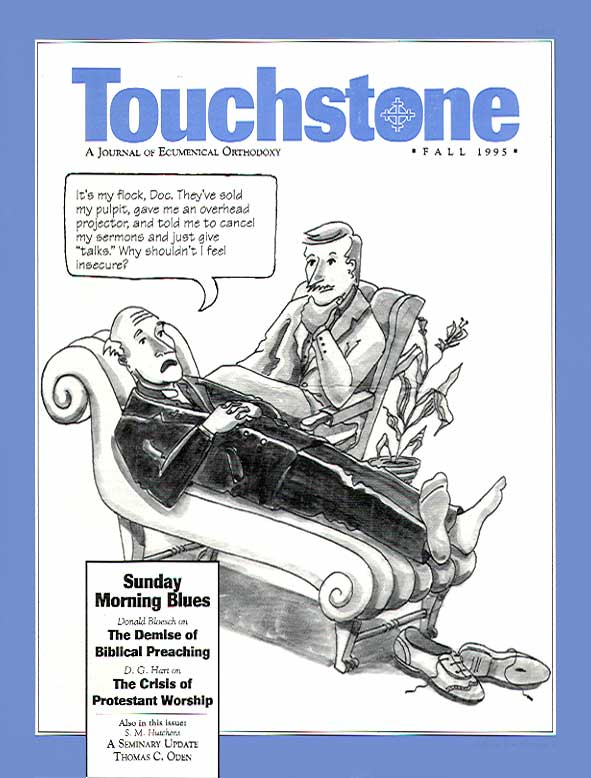The Demise of Biblical Preaching
Distortions of the Gospel and its Recovery
A friend of mine recently reported that a church he had previously pastored in New Zealand has removed the large, central pulpit (its only pulpit) and has substituted a screen, which is used for praise songs and choruses and also to relay graphically illustrated biblical stories and sermonic messages. What is surprising and disconcerting is that this church is related to the Church of Scotland, a branch of Christianity that has prided itself on biblical, expositional preaching. Yet what happened in this church is not unusual: throughout the Protestant world today there is an unmistakable movement from the audible to the visual, from word to image. Worship is fast becoming entertainment; the goal is no longer the glory of God and the service of his kingdom but the well-being and fulfillment of the human creature. Besides preaching, other casualties in this mega-shift include the prayer of intercession and corporate confession of sin followed by the assurance of pardon. Extended Scripture reading as a preparation for the sermon is also becoming less frequent. Solos or musical renditions by some special ensemble are increasingly taking the place of congregational singing.
The evangelical legacy that goes back to the Protestant Reformation and the renewal movements of Puritanism and Pietism sought to hold Word and sacrament together in dialectical tension, but the emphasis was on the preached Word of God. Karl Barth rightly observed that preaching virtually became a third sacrament in Reformation theology. The content of the sermon was the law and the gospel. We are to comfort the afflicted through the preaching of the gospel and afflict the comfortable through the preaching of the law (Luther). The goal of preaching was faith and obedience. The truth of divine revelation was regarded as something both objective and subjective. Its basis and content were objective, since it concerned God’s very utterance in conjunction with events in sacred history. Its communication was both objective and subjective, since this truth was given by the Spirit in the evangelical experience of an awakened heart.
Aberrations after the Reformation
The Reformation rediscovered the revitalizing power of biblical preaching, but within one generation an anthropocentric orientation began to supplant the theocentrism of the Reformers. The emphasis was no longer on justification by free grace received through faith and demonstrated in a life of obedience but rather on justification by belief in right doctrine (as in orthodoxy) or on human preparations and confirmations of justification (as in Pietism). A biblical sermon will indeed entail a call to decision, but our decision constitutes a response to the gospel rather than the content of the gospel. It is a response, moreover, induced by the outpouring of the Holy Spirit rather than an accomplishment of human free will, which would then make justification a matter of works as well as of grace.
In both conservative and liberal Protestantism that followed the Reformation, preaching often degenerated into moralism in which God’s acceptance of us was made contingent on human effort. Moralism is preaching the law without the gospel so that our hearers are told what to do in order to ensure for themselves a place in God’s kingdom rather than what God has already done for us and the whole world in Jesus Christ. Sometimes the gospel is made into a new law: it is no longer the divine promise but the divine commandment. Here Protestantism comes dangerously close to the style of preaching prevalent in the Catholic churches in which a moral homily, usually brief and to the point, takes the place of the kerygmatic proclamation.
Gnosticism is another temptation that we need to guard against if we are to remain faithful to the biblical and Reformation mandate of preaching the gospel to the whole creation. In gnosticism preaching is designed to awaken powers latent within the human psyche. The task of the preacher is to enable us to discover our own divinity or to realize untapped human possibilities. It also involves the claim to a secret knowledge of the future based on the right interpretation of biblical prophecy. The mystery of revelation is no longer the knowledge of the mighty acts of God open to all people of faith but a secret wisdom available only to those who submit themselves to the discipline of deciphering the apocalyptic code language in which a portion of the Bible is written.
Another aberration is what some in the Wesleyan-Holiness movement call easy believism and Dietrich Bonhoeffer termed cheap grace. Here we are confronted with a truncated form of orthodoxy in which the message of justification is fully affirmed, but the call to personal holiness—our response to God’s act of mercy—is muted or downplayed. In this kind of preaching we discern the gospel but not the law, whereas the whole gospel involves the preaching of the law as well as the good news of Christ’s victory over sin. A fully biblical sermon will sound the call to costly discipleship as well as celebrate the gift of costly grace—grace that cost God the life of his Son. Our mandate is to proclaim not only the message of the cross but also the command to take up our own crosses and follow Christ—not to gain salvation but to demonstrate a salvation already accomplished by God’s reconciling work in Jesus Christ.
In what I choose to call orthodoxism, teaching takes precedence over preaching and the sermon is reduced to Bible study, which can be edifying and instructive, but it is not the power of God unto salvation. The expansion of the human mind is a worthy goal, but what the sinner needs most is the regeneration of the human heart. Preaching will certainly entail a didactic as well as kerygmatic dimension, but if it remains didactic it will have little efficacy in convicting people of sin or instilling faith. Jesus was not simply a great teacher but the Savior of the world, and until we duly recognize this fact we will lack the power to make a genuine decision of faith. It is possible to preach from the Bible and yet not preach Jesus Christ or the gospel, and this is what both Protestant conservatives and liberals need to keep in mind in preparing men and women for the ministry.
Exhibitionism also lures many Protestants away from biblical and Reformation moorings. Here the aim of preaching is to make an impression on our audience rather than to give a faithful rendition of the scriptural message. Preaching becomes a performance rather than an act of obedience. The worship service is centered no longer on the Word but on the preacher—on the personality and talents that he or she brings. Preachers are expected to be masters in the art of communication more than diligent students of the Word. Their success is determined by the numbers who attend their services or give to church programs rather than by the work of the Holy Spirit in convicting people of sin and turning them to the cross in repentance and faith.
Religious enthusiasm is still another deviation from faith in the gospel. Enthusiasm, which involves constantly seeking new experiences of God, was roundly censured by both Luther and Wesley. Here the Spirit is elevated above the Word, and religious experience is prized more highly than fidelity to the gospel and the law. Sharing experiences often takes the place of expounding a biblical text. Faith to be sure is an experience as well as an act of commitment, but it is an experience that transports us beyond all experiences into communion with the living Christ. In faith we are taken out of our subjectivity into the service of the kingdom of Christ, which involves ministering to others. Luther said, “Our theology is certain because it takes us out of ourselves, out of our feelings and experiences, into the promises of God that never deceive.” There may be occasions when personal experience has a place in our preaching; yet we must never remain with the experience but always point to Christ’s experience of our sin, guilt, and death, which alone procured our salvation.
Finally we come to the heresy of politicizing the gospel in which the Church is reduced to an ethical culture society or a political lobby. The politicization of the gospel is often associated with liberal Christianity rather than evangelical Christianity, but today we see an ideological agenda intruding into the proclamation of the conservative church as well. Avoiding an ideological gospel does not mean that we should refrain from pointing our people to the political implications of the biblical gospel. Nor are we released from the obligation to preach against social evils, for this is included in the preaching of the law. At the same time, we should never confound the kingdom of God with a social program, or divine justification with social justice. Politicizing the gospel is a form of moralism, for it makes law rather than gospel the theme of our message.
What has brought about this abysmal state of affairs? Surely one determinative factor is the desire to make the gospel palatable to its cultured despisers and thus take away the scandal of the cross (1 Cor. 1:23). In the process the gospel has been redefined to include the celebration of human potential and freedom. Or we succumb to the temptation to interpret the gospel in light of the religio-cultural ethos that has shaped our identity (such as the American Way of Life), thereby blunting the rough edges of the gospel. Even in conservative circles the gospel as divine revelation is often confounded with the cultural baggage of various faith traditions. On one occasion a friend in theological academia gave a quiz to his class, asking them to define the gospel. He received as many definitions as there were students in the class, and many of these answers could not be reconciled. The gospel, of course, cannot be encapsulated in a simple definition, for this would convert the simple gospel into a simplified gospel. The doctrine of justification by faith belongs to the essence of the gospel, but it is not the whole of the gospel. The gospel also includes sanctification through the outpouring of the Spirit. The gospel is not only the message of salvation but also the power of salvation (Rom. 1:16), but this power is not within our control or possession.
Toward the Recovery of Biblical Preaching
The contemporary church—Protestant, Catholic, Orthodox—sorely needs the recovery of biblical, evangelical preaching. Protestantism in the tradition of the Reformation has been known for its stress on the cruciality of preaching, but now it is part of the problem rather than the solution.
We must learn again to preach the whole counsel of God—the full gospel—and this includes the law as well as the gospel. We preach the law in order to convict people of sin and also to guide them in the paths of righteousness. We preach the gospel in order to console and also to instill the motivation to do works of faith and love. We must never confuse the law and the gospel, but at the same time it is imperative that we affirm their inseparable unity. The gospel must never be converted into a new law, nor should the law ever be a substitute for the gospel.
Preaching plays a pivotal role in the service of worship, but it does not exhaust worship. It should take place in the context of worship, but worship entails much more than preaching. Worship is the corporate response—in prayer, singing, and reflection—to God’s self-revelation and reconciling work in Jesus Christ. Worship is not a performance designed to induce faith but a celebration of God’s mighty deeds, including the gift of faith by the power of his Spirit. Worship like preaching itself is centered in the audible, not the visual. We respond to what we hear from the reading of Scripture and from the mouth of the preacher. The visual is not excluded, for we worship God through the celebration of the sacraments as well as through prayer and hearing. Yet the visual is subordinated to the audible, for the sacrament gains its power only in its unity with the proclaimed and written Word of God.
Ideally the sermon is an interpretation of the scriptural text, not an exhibition of superior knowledge or the demonstration of communication skills. Preaching as well as the whole of worship has for its object the glory of God and the regeneration of sinful humanity. It is also designed to equip the saints for service in the kingdom of God.
Sermons that are biblical will be ipso facto theological as well. What is disturbing is that so many sermons from evangelical pulpits today are palpably nontheological. Pragmatic concerns overshadow doctrinal concerns, a point well made by Os Guinness, Mark Noll, David Wells and many other keen observers of the evangelical scene. The focus is on solving problems rather than interpreting God’s Word correctly. We urgently need to overcome our fear of theology if we are to be good expositors of God’s Word and thereby agents of God’s grace.
A few decades ago biblical preaching was high on the agenda of the mainline Protestant denominations. Under the influence of the biblical theology movement and neo-orthodoxy, theological seminaries were engaged in the challenging task of making the Bible central again in the Church’s worship and mission. The emphasis, however, was on gaining release from personal doubt and inward anxiety rather than on deliverance from sin, death, and hell. God’s reconciling work in Christ was duly celebrated, but it was often made to serve a social agenda—the reconciliation of classes and races. While preaching was still seen as a vital element in the Church’s life and worship, the shift from preaching to doing, from dogma to praxis was already apparent. With the rise of theologies of revolution, liberation, and multi-culturalism, preaching has increasingly been relegated to the background. It also has taken new forms, e.g., sharing stories of personal struggle and triumph. The Bible is no longer the infallible guide and norm for faith and practice but now a resource for spiritual growth and fulfillment. Scripture is interpreted through the lens of a hermeneutics of suspicion rather than through the lens of faith in the crucified and risen Savior.
I do not deny that there are still many faithful pastors who wrestle with Scripture and who know what the gospel is. Yet we seldom hear of them because they expend their energies in self-giving service to their congregations rather than seeking positions of affluence and power within their conferences and denominations. There is still a remnant (including some conference ministers and bishops) who confess the name of Christ and whose witness is used by the Spirit of God to preserve the Church from capitulation to demoralizing forces within the culture. But it is not enough that the Church should be preserved. The Church is called to advance under the banner of the gospel and bring the whole world into submission to Jesus Christ. The symbols of the Church will take on new vitality and power when the gospel is rediscovered by both clergy and laity. When people again hear the gospel and the law proclaimed from the pulpits, they will be motivated to confess their sins and become light and salt in a society that sorely needs regeneration.
What the Church needs today is not a return to scholastic orthodoxy or even to neo-orthodoxy. Nor should we try to restore the pristine theology of the Reformation. Instead, we should return to the Bible as hearers and learners, waiting for God to speak in a fresh way through his Spirit. We should see ourselves not as masters of a secret wisdom but as servants of the Word. We are not co-redeemers nor co-creators in forging the kingdom of God; instead, we are ambassadors of the Lord Jesus Christ having a message to proclaim and a commission to fulfill. If we take this task seriously Jesus’ words will come to fruition: “He who hears you hears me.” (Luke 10:16). We will then, and only then, be a means of grace to a lost and ailing world.
An expanded version of this article is available in The Church: Sacraments, Worship, Ministry, Mission, published by InterVarsity Press.
Donald G. Bloesch is Professor of Theology Emeritus at Dubuque Theological Seminary. He has written numerous books, including The Future of Evangelical Christianity, The Struggle for Prayer, Freedom for Obedience, and is currently working on a seven-volume systematic theology, Christian Foundations. He lives in Dubuque, Iowa, with his wife, Brenda.
subscription options
Order
Print/Online Subscription

Get six issues (one year) of Touchstone PLUS full online access including pdf downloads for only $39.95. That's only $3.34 per month!
Order
Online Only
Subscription

Get a one-year full-access subscription to the Touchstone online archives for only $19.95. That's only $1.66 per month!
bulk subscriptions
Order Touchstone subscriptions in bulk and save $10 per sub! Each subscription includes 6 issues of Touchstone plus full online access to touchstonemag.com—including archives, videos, and pdf downloads of recent issues for only $29.95 each! Great for churches or study groups.
Transactions will be processed on a secure server.
more on Christianity from the online archives
more from the online archives
calling all readers
Please Donate
"There are magazines worth reading but few worth saving . . . Touchstone is just such a magazine."
—Alice von Hildebrand
"Here we do not concede one square millimeter of territory to falsehood, folly, contemporary sentimentality, or fashion. We speak the truth, and let God be our judge. . . . Touchstone is the one committedly Christian conservative journal."
—Anthony Esolen, Touchstone senior editor













